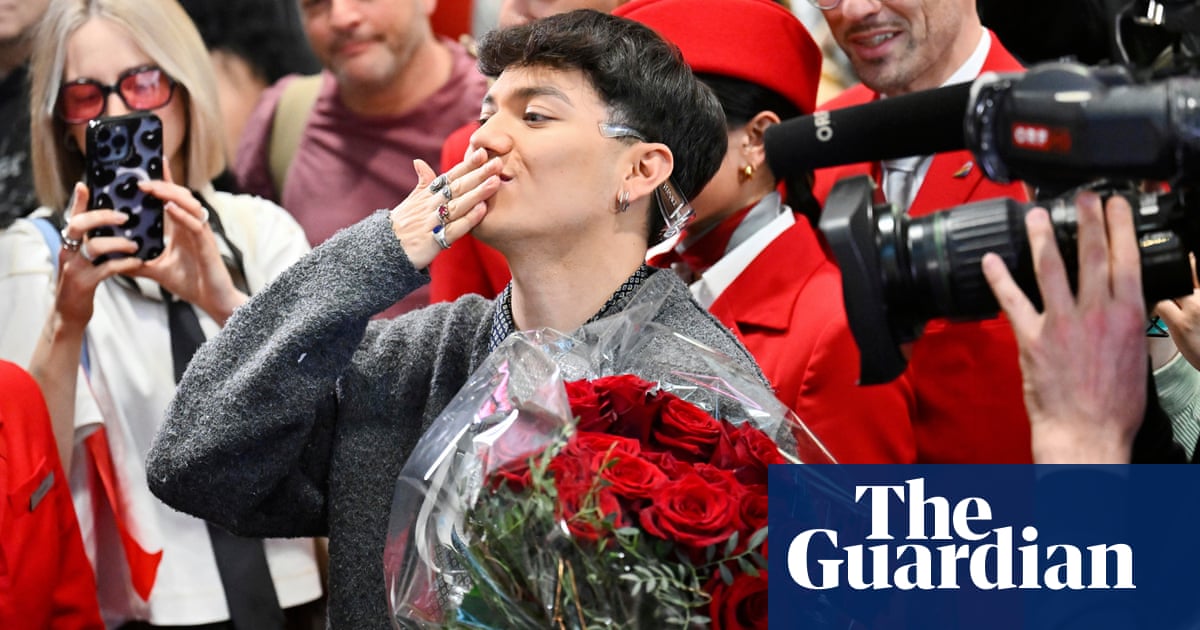Austrians were on Sunday celebrating JJ, an Austrian-Filipino countertenor lauded for “singing Austria into the spotlight” after bringing home the country’s firstEurovision song contest victoryin 11 years with a song that gives a nod to both the country’s rich operatic heritage and modern music.
JJ, 24, hit all the right notes with Wasted Love, an operatic ballad about unrequited love that mutates into a techno club anthem. The 69th edition of the contest was hosted in Basel, Switzerland.
The win was Austria’s third in the history of the competition, following drag performer Conchita’s success in 2014 and Udo Jürgens’ win in 1966.
“It’s wonderful to have this victory, 11 years after Conchita,” said Micaela Taroni, an Austrian-Italian correspondent in Rome for the Austrian press agency APA. “JJ won because of his vocal qualities. He’s a countertenor, so reaches the high notes. He was an outsider, but one who encompasses musical modernity with Austria’s rich operatic tradition.”
JJ, whose real name is Johannes Pietsch, won ahead of Israel’s Yuval Raphael, a survivor of the 7 October attacks by Hamas militants on southern Israel that killed 1,200 people and took 251 hostage, and led to Israel’s ongoing assault on Gaza in which an estimated 53,000 Palestinians have so far died.
As with 2024, Israel’s inclusion in the world’s biggest music competition, which was watched by more than 160 million people across the world, sparked protests.
Demonstrations were held in Basel earlier on Saturday evening and a Eurovision crew memberwas hit by paintafter two pro-Palestinian protesters tried to rush on stage as Raphael sang New Day Will Rise.
A spokesperson for Israeli broadcaster Kan said Raphael was “shaken and upset” by the protesters.
Many of the 200 protesters in Basel wore Palestiniankeffiyehscarves and carried signs stating: “No music for murder”, “Stop genocide” and “Singing while Gaza burns”.
Some burned huge Israeli and US flags and others sent red and green smoke into the air, according to the AFP news agency.
Pro-Palestinian marches were also held throughout the day in major cities around the world in protest against Israel’s intensified bombardment of Gaza and its enforced blockades of food and other humanitarian supplies.
In third place in the competition was Estonia’s Tommy Cash with Espresso Macchiato, a song poking fun at Italian stereotypes that both riled and enthused Italians.
After being presented with his winner’s trophy in Basel, JJ thanked his voters and called for “more love” in the world.
He said Wasted Love, which he co-wrote with Teodora Špirić and Thomas Turner, was intended to give listeners an insight into his deepest thoughts.
“There’s no wasted love. Love is never wasted,” he added. “There’s so much love that we can spread around, and we should use love as the strongest force on planet Earth.”
JJ’s success was applauded by the Austrian chancellor, Christian Stocker, who said the singer was writing musical history.
Beate Meinl-Reisinger, Austria’s foreign minister, wrote on X: “Dear JJ, you have movedEuropewith your voice and sung Austria into the spotlight.”
The Philippine consulate general in Frankfurt also issued a message of congratulations to JJ on Facebook.
Sign up toThe Guide
Get our weekly pop culture email, free in your inbox every Friday
after newsletter promotion
“What an incredible moment – Filipino pride on the European stage!” she said.
Austria will now host next year’s contest. JJ, who returned home on Sunday, said he would like the event to be held in Vienna, where he was born.
Once again, theEurovisionsong contest was pitiful for the UK’s contenders, who came 19th out of a possible 26 and receivednul pointsin the public vote for their appropriately named tune, What The Hell Just Happened?
In the final, all participating countries get two sets of votes – one from a jury comprising music experts and one from the public across Europe, who can vote by phone, text or the Eurovision app.
A score of 12 is awarded to the most popular act, 10 to the second-placed one, and the rest in a country’s top 10 scored from eight to one.
Despite the setback, Remember Monday, a trio comprising Lauren Byrne, Holly-Anne Hull and Charlotte Steele, said the contest had given them memories “that will last a lifetime”.
The band, the UK’s first girl group entrant since 1999, received 88 points from the national juries, including a generous 12 points from Italy, which last won the competition in 2021 with the now famous rock band Måneskin.
“Wow – what a ride,” Remember Monday said in a statement. “Three best mates walked on to the world’s biggest music stage and came out with a top 10 jury score, massive streaming numbers and memories that will last a lifetime.”
The UK, meanwhile, gave its top public vote of 12 points to Israel, although the British jury awarded no points to Raphael’s song.
Thirty-seven countries entered the contest and 26 made it to the final. The semi-finals threw up some surprises. Australia, which has competed in Eurovision since 2015, surprisingly failed to qualify with Go-Jo’s innuendo-ladenMilkshake Man.
There were still plenty of risque songs on offer, including Miriana Conte, who had to change the lyrics of her song Serving to remove a reference to the Maltese word for singing – “kant” – due to having an obvious resemblance to an English swear word. Despite it being a fan favourite, it scored poorly with the wider public.
In Finland’s entry, Ich Komme by Erika Vikman, her song repeatedly announced that she was coming, and she ended her performance hoisted up on a giant gold microphone spraying out fireworks.
Other outlandish props included Italy’s Lucio Corsi with an outsized piano and France’s Louane being covered with falling sand.
